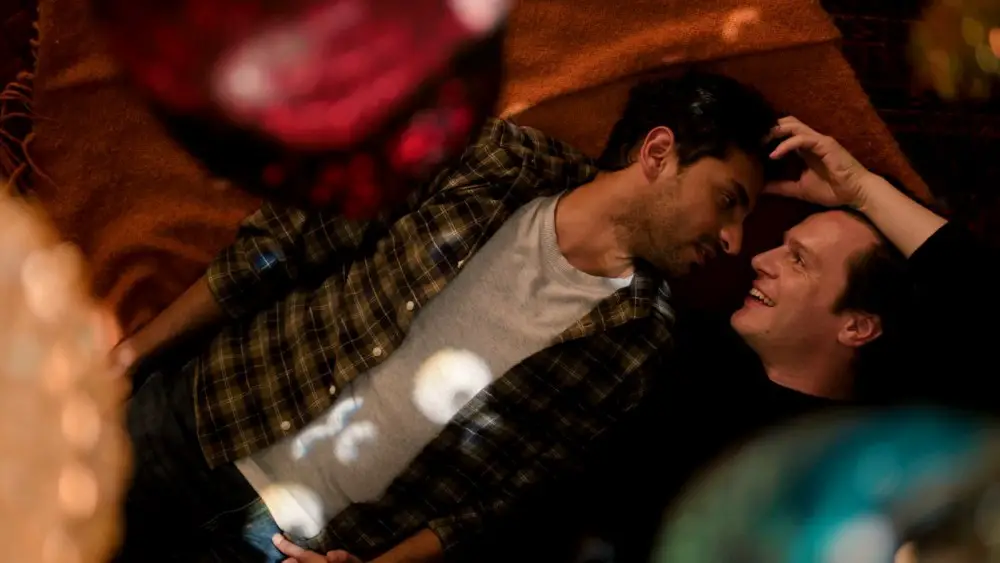Jonathan Groff, who sings Bollywood tunes, is the centerpiece of A Nice Indian Boy, the groundbreaking gay romance comedy that’s heating up the BFI London Film Festival.
Directed by Roshan Sethi and starring Gurov (Mindhunter, Glee, Doctor Who) and Karan Soni (Deadpool), this cross-cultural love story challenges Hollywood norms. It premiered at SXSW. The production aims to bring a new perspective to LGBTQ+ and South Asian representation on screen.
The origins of the project date back to 2019, when Levantine Films optioned Madhuri Shekhar’s play of the same name and Eric Randall adapted the script. Sethi joined the company in 2021 after producers saw his previous film, “7 Days.” After that, he approached his real-life partner Soni to co-star. Groff signed on after watching “7 Days.”
Set in the United States, the film follows a socially reserved doctor, Naveen (Soni), who brings her fiancé Jay (Groff) home to meet a traditional Indian family, but they meet a white orphaned artist named Boy. He will struggle to accept his friend and help the Indians with their plans. their dream wedding.
“This was probably the most personal thing we would ever make,” Soni says. “We always tried to [do] What feels real to us, to our experience. ” This personal connection extended to specific character choices as well. “This character wasn’t originally a doctor in the script,” Soni explains. “When Roshan [a qualified medical doctor] So I worked on the script a little bit, and it just felt right. It was like the modest parts of the character manifested in medicine in different ways. ”
Sethi says they weren’t concerned about representation or stereotypes. “Personally, I’m not concerned at all about whether the representation of South Asians is stereotypical or not, because everyone has their own life experiences,” he says. “If you’re making a film that reflects your lived experience, it doesn’t matter if it’s a stereotype or not.”
“I think what’s interesting about ‘diversity films’ in this current era is that they tend to be very homogeneous. They’re all Asian, or they’re all Indian, or they’re all black, or they’re all black. White people, quite the opposite, and the reality of our world is that we’re all intertwined, in messy ways. And this movie is very reflective of that, because it’s a meeting of cultures. Because there is,” Sethi says.
For Groff, who plays a white man adopted by Indian parents, the role required him to immerse himself in a culture with which he was largely unfamiliar. “I had never seen a Bollywood movie. I didn’t know anything about this culture in general,” Groff says. His preparation included watching the Bollywood classic ‘Dilwale Dulhania Le Jayenge’ (DDLJ) to capture the film’s key musical moments.
This scene where Groff’s character sings the evergreen song ‘Tujhe Dekha To Ye Jana Sanam’ from ‘DDLJ’ is a highlight of the film. “I didn’t know he was going to do that falsetto, la, la, la, la, la, that tricky thing,” Sethi says. “Everyone was excited,” Soni added.
Despite the cultural specificities, Groff found the family dynamics surprisingly relatable. “The moment I saw the first take of the first scene, I couldn’t believe everything looked so familiar,” he says. “There were big cultural differences, but it was really heartwarming to see that no matter what culture you are in, family is family.”
Production faced significant challenges, primarily due to a compressed schedule. Sethi reveals that the pre-production period was just four weeks and the filming period was 21 days, six days a week. “We were like this little indie movie crammed in between other much bigger, broader situations,” he said of Sony’s “Deadpool” efforts and the then-pressing issues. mentioned the SAG-AFTRA strike.
Financing the film also proved difficult. “We could hardly make this film. We could barely find the money. We struggled for years,” says Sethi. He points out that Groff’s involvement was crucial in securing funding. Sethi calls Hollywood “one of the most racist industries in America” and explains that “no Indian actor is considered important enough to get a loan.”
The film marks a personal milestone for Sethi, who continues to work in the medical field. “I was closeted six years ago and now I’m making this film. It’s very personal,” he says. “I never could have imagined it when I was a straight doctor walking around hospitals and looking at what was going on in the hospital. [HBO’s] I loved seeing Looking released, much less loved making this movie. ”
Sony also shares this sentiment. “I started auditioning in Hollywood in 2009, and I can’t imagine ever getting the lead role in something once, and then twice, in so many productions, something so personal. I have experienced it.”
“A Nice Indian Boy” is scheduled to be released in theaters in the first quarter of next year, with streaming available later. The filmmakers are optimistic about its commercial prospects, citing positive responses from various audiences. “When we tested this film with audiences, the highest scores were always from white women,” Sethi points out.
The team hopes the film will resonate beyond a niche audience. “Another part of the problem with the so-called diverse film and representation movement is that it makes it feel like these films are for a niche audience,” Sethi says. “The truth is, diversity should open the doors of storytelling and let people discover more interesting, newer stories to tell, but it just reinvigorates the art. They don’t divide it or make it more niche. They revitalize it.”
The cast is working on new projects as they prepare for the film’s wide release. Soni is set to star in the thriller Fade to Black, while Sethi is working on a new romantic comedy script called Return to Straight. Fresh off a Tony Award win for Broadway’s “Merrily We Roll Along,” Groff returns to the Great White Way in “Just in Time,” a new musical about the life and times of singer Bobby Darin. It’s coming.
